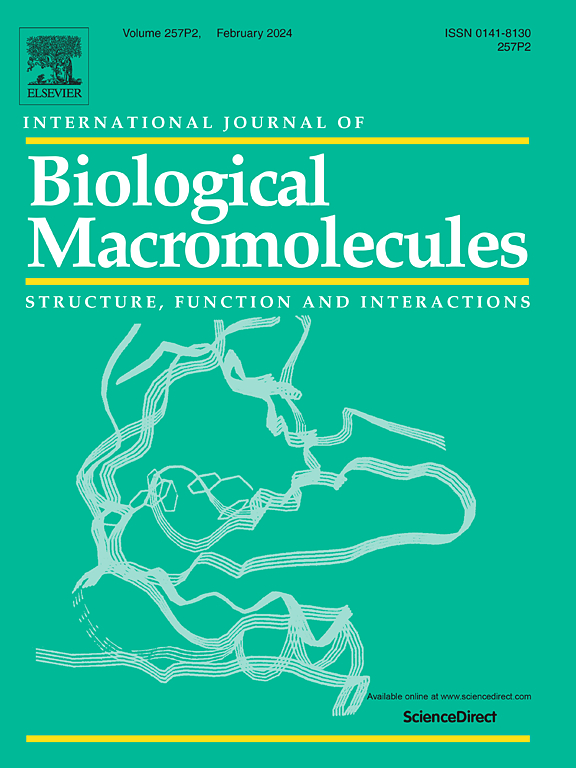黄芪多糖通过丰富罗伊氏乳杆菌和丙酸盐来减轻高脂肪饮食下急性胰腺炎的严重程度。
IF 7.7
1区 化学
Q1 BIOCHEMISTRY & MOLECULAR BIOLOGY
International Journal of Biological Macromolecules
Pub Date : 2025-01-20
DOI:10.1016/j.ijbiomac.2025.140021
引用次数: 0
摘要
急性胰腺炎(AP)是一种严重的消化系统疾病,高脂肪饮食(HFD)通过炎症和肠道微生物群破坏而恶化。黄芪多糖(黄芪多糖),以其抗炎特性而闻名,可能通过调节肠道微生物群来减轻hfd诱导的AP恶化。本研究探讨了在HFD (HAP)下APS对AP严重程度的影响。结果显示,HFD显著加重AP,血清酶、促炎细胞因子和胰腺损伤升高。单细胞RNA测序显示,在HAP小鼠中,ICAM1+中性粒细胞增加,NF-κB/necroptosis通路激活。APS治疗可减少中性粒细胞浸润,下调NF-κB,抑制坏死性坏死。APS还能恢复肠道菌群平衡,提高罗伊氏乳杆菌(L. reuteri)和丙酸(PA)水平。罗伊氏乳杆菌或PA干预可降低HAP的严重程度,联合治疗显示出协同效应。这些发现表明,黄芪多糖的保护作用是由微生物依赖机制介导的,强调肠-胰轴是黄芪多糖的潜在治疗靶点。本文章由计算机程序翻译,如有差异,请以英文原文为准。
Astragalus polysaccharide reduces the severity of acute pancreatitis under a high-fat diet through enriching L. reuteri and propionate
Acute pancreatitis (AP) is a severe digestive disorder, worsened by a high-fat diet (HFD) through inflammation and gut microbiota disruption. Astragalus polysaccharides (APS), known for their anti-inflammatory properties, may alleviate HFD-induced exacerbation of AP by modulating gut microbiota. This study investigates the effect of APS on AP severity under a HFD (HAP). Results show that HFD significantly worsens AP, with elevated serum enzymes, pro-inflammatory cytokines, and pancreatic damage. Single-cell RNA sequencing revealed increased ICAM1+ neutrophils and activation of the NF-κB/necroptosis pathway in HAP mice. Treatment with APS reduced neutrophil infiltration, downregulated NF-κB, and suppressed necroptosis. APS also restored gut microbiota balance, boosting Lactobacillus reuteri (L. reuteri) and propionate (PA) levels. Interventions with L. reuteri or PA reduced HAP severity, with combined treatment showing synergistic effects. These findings suggest that the protective effect of APS is mediated by microbiota-dependent mechanisms, highlighting the gut-pancreas axis as a potential therapeutic target for AP.
求助全文
通过发布文献求助,成功后即可免费获取论文全文。
去求助
来源期刊
CiteScore
13.70
自引率
9.80%
发文量
2728
审稿时长
64 days
期刊介绍:
The International Journal of Biological Macromolecules is a well-established international journal dedicated to research on the chemical and biological aspects of natural macromolecules. Focusing on proteins, macromolecular carbohydrates, glycoproteins, proteoglycans, lignins, biological poly-acids, and nucleic acids, the journal presents the latest findings in molecular structure, properties, biological activities, interactions, modifications, and functional properties. Papers must offer new and novel insights, encompassing related model systems, structural conformational studies, theoretical developments, and analytical techniques. Each paper is required to primarily focus on at least one named biological macromolecule, reflected in the title, abstract, and text.

 求助内容:
求助内容: 应助结果提醒方式:
应助结果提醒方式:


